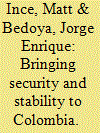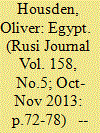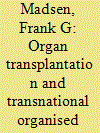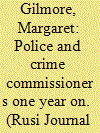| Srl | Item |
| 1 |
ID:
126310


|
|
|
|
|
| Publication |
2013.
|
| Summary/Abstract |
The Colombian government's peace negotiations with the FARC have been paralleled by a military strategy designed to weaken the guerrilla groups. However, this is only one of the many foci of the country's military strategy. On 20 August 2013, Matt Ince interviewed Jorge Enrique Bedoya, Vice Minister of Defense for Policy and International Affairs, about Colombia's current and future security and defence challenges.
|
|
|
|
|
|
|
|
|
|
|
|
|
|
|
|
| 2 |
ID:
126315


|
|
|
|
|
| Publication |
2013.
|
| Summary/Abstract |
Morsi's ousting by the army and the conspicuous presence of former regime sympathisers in the new interim government has left Egypt facing yet another crisis. As political parties prepare for parliamentary elections scheduled for early 2014, an analysis of Egypt's elite powers, which have shaped the turbulent political course since the fall of Hosni Mubarak, is therefore especially pertinent to understanding Egypt today.
|
|
|
|
|
|
|
|
|
|
|
|
|
|
|
|
| 3 |
ID:
126314


|
|
|
|
|
| Publication |
2013.
|
| Summary/Abstract |
In June 2013, Kapitänleutnants Helena Linder-Jeß and Inka von Puttkamer assumed command of two of the German navy's Frankenthal-class minehunters. Whilst rotation of command is nothing new within naval service, what is different this time round is that both Kapitänleutnants are the first women to do so.
|
|
|
|
|
|
|
|
|
|
|
|
|
|
|
|
| 4 |
ID:
126309


|
|
|
|
|
| Publication |
2013.
|
| Summary/Abstract |
If ongoing peace talks with the FARC succeed, it is unclear what will become of the guerrilla group's illicit finance networks; who would replace the FARC in the drug-trafficking chain should they demobilise; and what would happen to their business interests in other illegal sectors. Against this backdrop, Matt Ince assesses whether a potential future peace deal with Colombia's oldest insurgent group could open the door to new sources of violence and insecurity in Colombia in the period ahead, as rival criminal organisations compete with one another to gain control over the FARC's current portfolio of illegal activities.
|
|
|
|
|
|
|
|
|
|
|
|
|
|
|
|
| 5 |
ID:
126313


|
|
|
|
|
| Publication |
2013.
|
| Summary/Abstract |
In wars fought within and ultimately for the support of civilian populations, the gender dimension becomes a vital one. Simply put, the success or failure of a campaign could, in part, hinge on the roughly 50 per cent of the population that is female. Jody M Prescott tackles the issue of gender mainstreaming in NATO, and suggests a comprehensive evolution of doctrine, tactics and personnel policy is needed.
|
|
|
|
|
|
|
|
|
|
|
|
|
|
|
|
| 6 |
ID:
126307


|
|
|
|
|
| Publication |
2013.
|
| Summary/Abstract |
Advancement in medical knowledge and lifestyle changes in contemporary society have led to an increasing demand for organs for transplantations, which supply cannot meet. This creates a new space for criminal activity in the illicit procurement and transplantation of human organs. Frank G Madsen surveys the many - ultimately unsuccessful - attempts to address the criminal trade in organs, and shows how current international and municipal legal frameworks fall short of providing an adequate way to conceptualise and eventually solve what is likely to be an increasingly pressing problem.
|
|
|
|
|
|
|
|
|
|
|
|
|
|
|
|
| 7 |
ID:
126308


|
|
|
|
|
| Publication |
2013.
|
| Summary/Abstract |
Before being able to establish whether certain kinds of organised cyber-crime constitute a security threat, it is important to consider the wide variation in structure and targets of cyber-criminal organisations, some of which are state agencies or state-sponsored organisations, or involve collaboration between states and private entities. Peter Grabosky argues that some forms of organised cyber-crime may be a nuisance but they cannot be regarded as threats to national or international security, while cyber-crimes do impact on national security and can lead to international conflict. In either case, traditional definitions of organised crime do not accurately reflect the nature or organised cyber-crime.
|
|
|
|
|
|
|
|
|
|
|
|
|
|
|
|
| 8 |
ID:
126311


|
|
|
|
|
| Publication |
2013.
|
| Summary/Abstract |
The Internet is often singled out as the key means through which extremists and terrorists are radicalised. Yet, argue Charlie Edwards and Luke Gribbon, research thus far has fallen short of unearthing the actual mechanisms through which this radicalisation takes place. Using examples from a wider study, they explore different ways in which individuals have used the Internet in their processes of radicalisation and point out that policy-makers and researchers need to focus their efforts on understanding not merely the content that is available online, but the ways in which this content is used in the process of radicalisation.
|
|
|
|
|
|
|
|
|
|
|
|
|
|
|
|
| 9 |
ID:
126312


|
|
|
|
|
| Publication |
2013.
|
| Summary/Abstract |
A year ago, policing in England and Wales underwent a monumental change with the first direct elections of police and crime commissioners (PCCs). Yet the establishment of this new post and the roles and responsibilities of these newly elected officials were little understood by voters at the time and turn-out was extremely low. A year on, Margaret Gilmore looks at how the new PCCs fared in their first year and analyses a YouGov poll on how the public's perceptions have changed now that PCCs are a reality.
|
|
|
|
|
|
|
|
|
|
|
|
|
|
|
|
| 10 |
ID:
126316


|
|
|
|
|
| Publication |
2013.
|
| Summary/Abstract |
Despite the various efforts of the international community to stall Iran's suspected nuclear-weapons programme - whether through economic sanctions, assassination or cyber-attack - the country has reportedly continued its progression towards a nuclear-weapon capability. In this article, Kenneth S Brower evaluates the capacity of Israel, acting unilaterally, and of the US, either acting alone or at the head of a coalition, to reverse this progress through military strikes. The result of this assessment is to turn on its head the conventional wisdom that the US - but not Israel - would be successful in acting unilaterally against Iran.
|
|
|
|
|
|
|
|
|
|
|
|
|
|
|
|
| 11 |
ID:
126317


|
|
|
|
|
| Publication |
2013.
|
| Summary/Abstract |
In the inter-war years, it was important for Britain to preserve friendly relations and influence throughout its empire to maintain competitive advantage in markets in a time of austerity. One way of doing this was through the export of cultural imperialism, and colonial administrations in particular were keen to maintain their hold over indigenous populations by preserving the cultural ideologies and brand (and thereby associated power) of the mother country. David Hammond argues that the military band was a particularly effective and economical resource for this: through the expression of British symbols, routines and rituals, they epitomised the British control systems and power structures without the need for 'hard power' engagement.
|
|
|
|
|
|
|
|
|
|
|
|
|
|
|
|